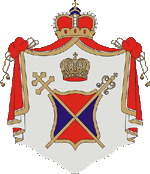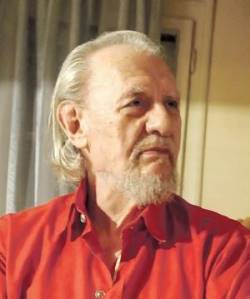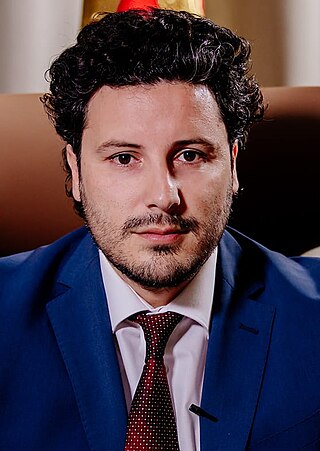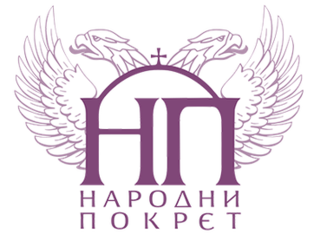Contents
| |||||
| Decades: | |||||
|---|---|---|---|---|---|
| See also: | |||||
Events in the year 2021 in Montenegro .
| |||||
| Decades: | |||||
|---|---|---|---|---|---|
| See also: | |||||
Events in the year 2021 in Montenegro .
Ongoing — COVID-19 pandemic in Montenegro

Milo Đukanović is a Montenegrin politician who served as the President of Montenegro from 2018 to 2023, previously serving in the role from 1998 to 2002. He also served as the Prime Minister of Montenegro and was the long-term president of the Democratic Party of Socialists of Montenegro, originally the Montenegrin branch of the League of Communists of Yugoslavia, which governed Montenegro alone or in a coalition from the introduction of multi-party politics in the early 1990s until its defeat in the 2020 parliamentary election. He is the longest-ruling contemporary politician in Europe, having held key positions in the country for over 33 years. However, he was defeated by the 36-year-old centrist former economy minister, Jakov Milatović, after the presidential run-off held on 2 April 2023.

The Montenegrin Orthodox Church is a canonically unrecognized Eastern Orthodox Church. It was formed in 1993 and registered as a non-governmental organization. Antonije Abramović was appointed as its first metropolitan. It claims succession to an older and autocephalous Montenegrin Church, which operated until the unification of the Kingdom of Serbia and Kingdom of Montenegro, later to join the Kingdom of Serbs, Croats and Slovenes in 1918.

Liberal Party of Montenegro is a liberal and nationalist political party in Montenegro.

The culture of Montenegro is as pluralistic and diverse as its history and geographical position would suggest. Montenegro's culture has been influenced by the Serbian Empire, the Byzantine Empire, ancient Greece, ancient Rome, Christianity, the Ottoman Empire, the Republic of Venice, Austria-Hungary, and Yugoslavia.

The Bosniak Party is a conservative and national conservative political party of the Bosniak minority in Montenegro. Its founder and first leader was Rafet Husović, while the party is currently led by Ervin Ibrahimović, MP, who is also serving as the party's parliamentary group leader in the Parliament of Montenegro.

Jevrem Brković was a Montenegrin poet, writer, journalist, dissident and historian. Brković was one of the founders and member of Doclean Academy of Sciences and Arts (DANU), a parallel scholars' academy in Montenegro, disputed by the national Montenegrin Academy of Sciences and Arts (CANU), parallel academy dissolved in 2015 with its membership, including Brković rejoined CANU.
Balša Brković is a Montenegrin writer, essayist and theatre critic. He is also editor of cultural section of daily newspaper Vijesti, and one of the prominent members of the political party United Reform Action (URA).

The Democratic Front was a right-wing populist and socially conservative political alliance in Montenegro. It was composed of the New Serb Democracy, Movement for Changes and Democratic People's Party, with some other minor parties as the alliance's partners at the local level, while United Montenegro and Workers' Party were external members of the Democratic Front parliamentary group. The alliance was formed mainly to overthrow the Democratic Party of Socialists, the party in power from the introduction of the multi-party system until the 2020 parliamentary election.

Rafet Husović was a Montenegrin politician, who served as the Deputy Prime Minister of Montenegro. He was the founder and long-term president of the centre-right Bosniak Party, an ethnic minority party for promotion of interests of Bosniaks.

Dritan Abazović is a Montenegrin politician who served as Prime Minister of Montenegro and as acting Minister of Foreign Affairs from 2022 to 2023. An ethnic Albanian, he heads the United Reform Action party. He previously served as deputy prime minister in the cabinet of Zdravko Krivokapić from 2020 until 2022.
The COVID-19 pandemic in Montenegro has resulted in 251,280 confirmed cases of COVID-19 and 2,654 deaths.

Joanikije II is a Serbian Orthodox metropolitan bishop serving as the Metropolitan of Montenegro and the Littoral and the primate of the Serbian Orthodox Church in Montenegro since May 2021, previously he served as the administrator of the same diocese from October 2020, and death of his predecessor Amfilohije (Radović). Bishop Joanikije was the head of the Eparchy of Budimlja and Nikšić from 2002 until 2021 and titular bishop of Budimlja betweein 1999 and 2002.

The Popular Movement of Montenegro, commonly known as simply Popular Movement, is a conservative regionalist political party in Montenegro, formed in February 2021 from the political alliance of the same name. The alliance, which was formed back in May 2020 prior to the August parliamentary election, ran within the common opposition "For the Future of Montenegro" list. The party also seeks to represent Serb ethnic interests. Party founder and current leader is Montenegrin-Serbian businessman Miodrag "Daka" Davidović, who is known as a great benefactor of the Serbian Orthodox Church and a longtime financier of the Montenegrin opposition during the a thirty-year long DPS-led regime in Montenegro. NP has no seats in the national parliament and is yet to contest the elections, its currently operating regionally within the country's second-largest municipality of Nikšić and its surrounding areas.

Zdravko Krivokapić is a Montenegrin professor and former politician who served as Prime Minister of Montenegro from 2020 to 2022.
Miodrag "Daka" Davidović is a Montenegrin businessman, economist and politician, prominent representative of Serbs from Montenegro, benefactor of the Serbian Orthodox Church and a longtime financier of the Montenegrin opposition during the a thirty-year long DPS rule in Montenegro. Davidović is founder and the current leader of the Popular Movement, conservative political party in Montenegro.
Anti-Montenegrin sentiment is a generally negative view of Montenegrins as an ethnic group, commonly involving denial of the Montenegrin ethnicity and language, and negative feelings towards Montenegro. It is present in right-wing discourse in Montenegro and the ex-Yugoslavia region, mainly Serbia, and dates back to the 19th and 20th century.
In April 2021, a wave of protests, dubbed by its organizers as the Montenegrin Spring, or the Montenegrin Response or Montenegrin Answer, was launched in Montenegro against the announced adoption of regulations that will make it easier to acquire Montenegrin citizenship, but also take away the citizenship of some Montenegrin emigrants, which the protesters consider as an "attempt of the government to change the ethnic structure of Montenegro" and against the Krivokapić Cabinet, which the protesters accuse of being "treacherous" and the "satellite of Serbia".

Ervin Ibrahimović is a Montenegrin politician serving as the vice president of the Parliament of Montenegro since December 2021 and the current president of the conservative Bosniak Party (BS), minority party representing Bosniaks in Montenegro, succeeding the party founder Rafet Husović in 2021.

Ne damo Crnu Goru, lit. 'We won't give up Montenegro', is a moderate right, pro-EU, pro-Serbian Orthodox Church, political organization in Montenegro. It became an influential civil and political movement during the 2020 religion law protests. The group was founded by Montenegrin professors and intellectuals in support of the Serbian Orthodox Church-led protests after a controversial law targeted the legal status and the property of the Church. Its founder and first chairman was university professor Zdravko Krivokapić, who led the opposition party For the Future of Montenegro at the 2020 parliamentary election.

A series of violent protests against the enthronement of Joanikije Mićović of the Serbian Orthodox Church as the Metropolitan of Montenegro and the Littoral took place at the historic Cetinje Monastery in September 2021.